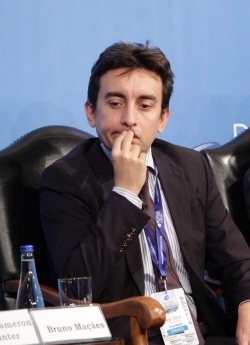Top Qs
Timeline
Chat
Perspective
Bruno Maçães
Portuguese philosopher, journalist, politician, consultant and author From Wikipedia, the free encyclopedia
Remove ads
Bruno Maçães is a Portuguese philosopher, journalist, politician, consultant and author. He is a former Secretary of State for European Affairs in Portugal and a columnist for the New Statesman.[1] He is a member of the European Council on Foreign Relations,[2] and also a member of the Advisory Council for the Brussels Institute of Geopolitics.[3]
This biographical article is written like a résumé. (November 2023) |

Remove ads
Education
He studied at the University of Lisbon and Harvard University, where he wrote his doctoral dissertation under Harvey Mansfield.[4]
Career
Summarize
Perspective
His tenure as Secretary of State for European Affairs in Portugal took place during the country's financial crisis. In 2013 the main Greek newspaper wrote that he was very German in his economic views.[5] He told an audience in London that Germany has a "hypocritical" view to trade negotiations.[6] He was described by Wolfgang Munchau as "reinventing the wheel" after tabling a number of proposals for eurozone reform.[7] In April 2014, he defended an energy pact between the United States and Europe to face the Russian threat.[8] His strategy was to create an energy revolution and move Europe to the Atlantic.[9] Also in 2014, he was the first Western politician to visit Mariupol as it remained under Russian attack.[10]
Maçães left government in November 2015. He was a senior fellow at Carnegie Europe, the Hudson Institute and Renmin University of China in Beijing.[11] He is the author of five books: Dawn of Eurasia: On the Trail of the New World Order, Belt and Road: A Chinese World Order, History Has Begun: The Birth of a New America, Geopolitics for the End Time: From the Pandemic to the Climate Crisis, and World Builders. In Maçães's view, China's Belt and Road Initiative is the world's first transnational industrial policy as it goes beyond national policy to influence the industrial policy of other states.[12] His book The Dawn of Eurasia, published by Penguin in January 2018,[13] argued that the distinction between Europe and Asia had disappeared.[14] In 2018, The Dawn of Eurasia was granted the international Ranald MacDonald Award. His book History Has Begun describes a theory of "virtualism".[15] Geopolitics for the End Time was reviewed by Paul Krugman in the New York Review of Books.[16] In 2025, Maçães wrote World Builders: Technology and the New Geopolitics in which he argues that artificial intelligence will reshape 21st century geopolitical struggles.[17] The book was reviewed by G. John Ikenberry in Foreign Affairs.[18]
Remove ads
References
Wikiwand - on
Seamless Wikipedia browsing. On steroids.
Remove ads
